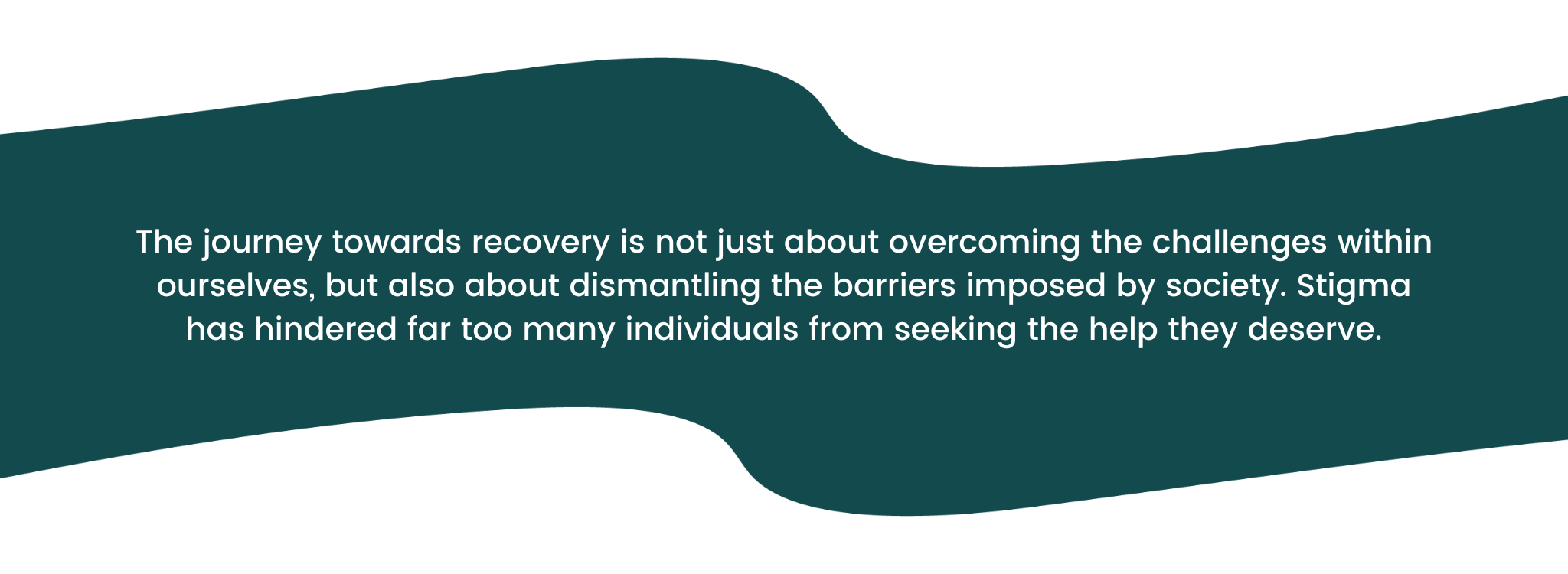Living with a mental health condition or grappling with Substance Use Disorder (SUD) can often feel like navigating a labyrinth of judgment, misunderstanding, and isolation. Reach for Recovery has been serving the community for over 50 years and has witnessed firsthand the profound impact that stigma can have on individuals seeking help for their mental health and substance use struggles. In this article, we want to shed light on the pervasive stigma surrounding SUD, focusing on the barriers it creates for those in need of support and treatment.
Stigma is a silent but formidable adversary, constructing walls between individuals and the care they deserve. It manifests in the form of stereotypes, discrimination, and fear, leading many to suffer in silence rather than seek help. Whether it’s the belief that addiction is a moral failing or the misconception that mental illness is a sign of weakness, stigma permeates our society, casting a shadow over those who need compassion and understanding the most.
But what makes stigma even more insidious is its entanglement with mental health. While mental health and SUD stigma are distinct, they often intersect and reinforce each other. Individuals with co-occurring disorders not only face stigma associated with their addiction but also confront judgment and misconceptions about their mental health struggles. This concurrent stigma creates a tangled web of shame and self-doubt, making it even more challenging for individuals to seek the help they need.
Understanding the Intersection of Stigma: Barriers to Recovery
Stigma, in its many forms, serves as a formidable obstacle for individuals grappling with mental health challenges and SUD. This stigma not only impedes access to care but also exacerbates the complexities of seeking help for SUD.
Defining Stigma and Its Impact
Stigma is more than just a label; it’s a pervasive societal force that shapes perceptions and attitudes towards addiction. As defined by the American Psychological Association, “A stigma implies social disapproval and can lead unfairly to discrimination against and exclusion of the individual.” Whether it’s the stereotype of the “addict” as morally flawed or the misconception that individuals with SUD lack willpower, stigma manifests in myriad ways, leading to shame, self-doubt, and isolation.
Individuals facing SUD not only contend with the stigma associated with their addiction but also confront judgment and discrimination due to societal misconceptions. This stigma creates a daunting barrier to seeking help, compounding the challenges of recovery.
The intersection of mental health and SUD stigma intensifies the obstacles faced by individuals seeking treatment. Fear of judgment and discrimination can deter individuals from reaching out for support, leading to delayed intervention and worsening of symptoms. Moreover, the pervasive nature of stigma can undermine self-esteem and confidence, hindering progress towards recovery.
Breaking Down Barriers
Addressing stigma in SUD treatment is paramount to breaking down barriers to recovery. By fostering environments of understanding, empathy, and acceptance, we can create safe spaces where individuals feel empowered to seek help without fear of judgment or discrimination. It’s essential to recognize that addiction is a complex health condition deserving of compassion and support.
Consequences of Stigma and Our Approach to Creating a Stigma-Free Environment
Stigma directed towards SUD carries profound consequences that reverberate through individuals, families, and communities. As stated by the National Institute on Drug Abuse, “Although substance use disorders are chronic and treatable medical conditions, studies show people with these disorders still face discrimination and stigma that can impact their health and well-being in numerous ways.” This stigma not only hinders individuals from seeking help but also perpetuates cycles of shame, self-blame, and isolation. When individuals feel stigmatized, they may internalize negative beliefs about themselves, leading to diminished self-worth and a reluctance to engage in treatment. Moreover, stigma can strain relationships, disrupt social support networks, and contribute to feelings of alienation and loneliness.
Our Commitment to Stigma Reduction
At Reach for Recovery, we prioritize creating a stigma-free environment where individuals feel safe and supported in their recovery journey. We are committed to creating an environment of understanding, compassion, and acceptance, where individuals feel valued and supported on their journey towards recovery. Our approach to stigma reduction encompasses various initiatives aimed at challenging stereotypes, fostering empathy, and promoting inclusivity. Through education and awareness-building efforts, we strive to dispel myths and misconceptions surrounding mental health and addiction.

However, amidst the darkness of stigma, there is hope. We’ve seen the transformative power of compassion, understanding, and acceptance in fostering healing and recovery. It’s never too late to reach out. For yourself, or for a loved one. Whether you’re struggling with addiction or supporting someone on their journey to wellness, know that you are not alone. Let’s take that first step toward healing, towards understanding, and towards a future free from the constraints of stigma.
